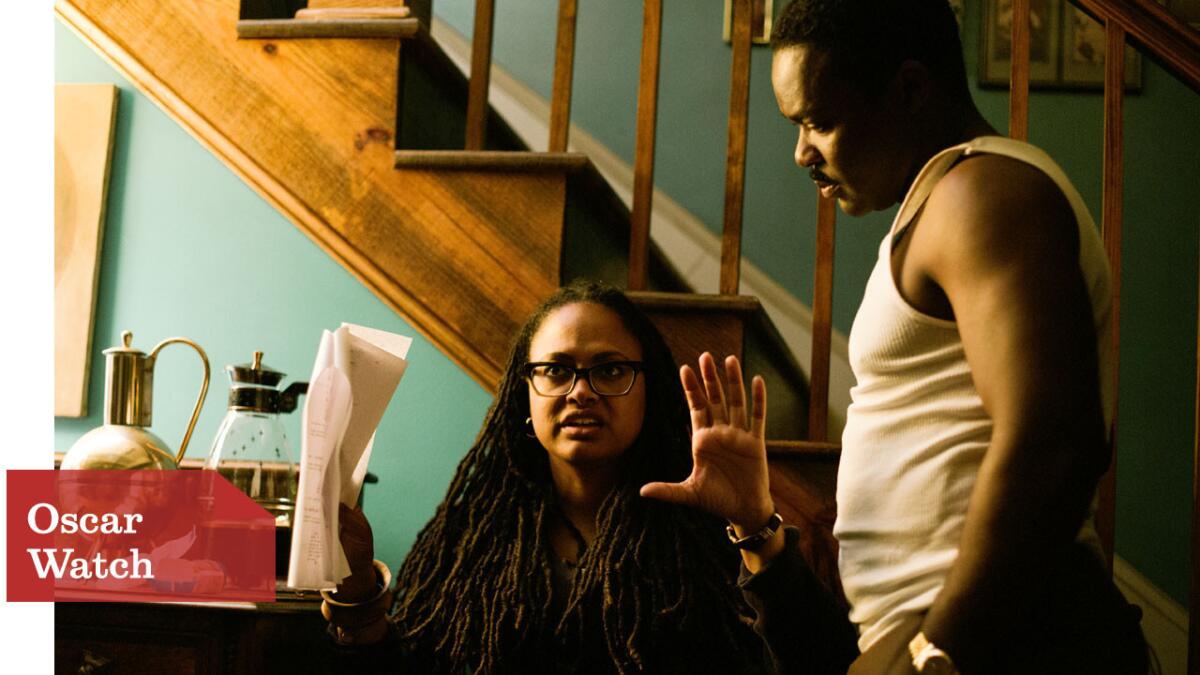Gold Standard: Oscar Watch: ‘Selma’ faces Award Season Truth Squad
Oscar Watch — a look at who and what is up and down this award season — comes to you every Monday. While we're waiting for the Du Pont estate's review of "Foxcatcher," here's what's going on this last week of 2014.

'Selma'
Movies based on historical events must always pass through the Award Season Truth Squad, which parses the dramatic license filmmakers take and, without considering the aims of said alterations, passes judgment.
We haven't (yet) heard any complaints about "Foxcatcher," "American Sniper" or "Unbroken," but Joseph Califano, a former senior aide to President Lyndon B. Johnson, has vented his anger over Ava DuVernay's civil rights drama "Selma." In a guest editorial published in the Washington Post, Califano assailed "Selma" for falsely portraying Johnson as being at odds with King and not giving Johnson enough credit for the Selma voting rights march. ("Selma was LBJ's idea," Califano writes.)
Now, I'm no expert. Most of what I know about LBJ comes from reading reviews of Robert Caro's landmark biography of Johnson. But to say Selma was LBJ's idea seems a stretch, even to Califano, who refutes his own claim later in the column as he lays out the chronology of the events. All in all, it's a pretty loopy piece of writing, capped off by an odd call to arms: "The movie should be ruled out this Christmas and during the ensuing awards season."
When, exactly, did the 83-year-old Califano start following "awards season" so intensely? It doesn't smell like something an 83-year-old former Washington insider would write. But then, we know from experience that not everyone comes up with their own material this time of year.
And while we're asking questions, how about this: Why would a black filmmaker like DuVernay need to lionize LBJ in her civil rights movie? Can't Califano just go and watch "Mississippi Burning" again and let the rest of us have a movie where in which people aren't relegated to the sidelines of history?
Lead actress race
At this coming weekend's Palm Springs International Film Festival, held in the hangar-sized Palm Springs Convention Center, more people will see Julianne Moore accept an award for her work in "Still Alice" than have probably seen the movie itself.
"Still Alice," in which Moore plays a linguistics professor beset by early-onset Alzheimer's, played for a week in a couple of theaters in Los Angeles and New York to qualify for Oscar consideration. It will return on Jan. 16, presumably able to trumpet a nomination for Moore and, thus, secure an audience.
At least Moore's movie has played theatrically. "Cake," the indie drama that has put Jennifer Aniston squarely into the Oscar conversation, won't open until the last day of the year and, again, just for a week to qualify.
So when Oscar nominations are announced Jan. 15, most people will recognize the names but will have no idea why they're being celebrated. That's a problem on a number of levels, emblematic of the dearth of strong stories focused on women, as well as the lack of confidence that, even when those stories manage to get made, moviegoers will be interested in seeing them. It's hard for the public to care about an Oscar race when people have never heard of the nominated performances.
Twitter: @glennwhipp
From the Oscars to the Emmys.
Get the Envelope newsletter for exclusive awards season coverage, behind-the-scenes stories from the Envelope podcast and columnist Glenn Whipp’s must-read analysis.
You may occasionally receive promotional content from the Los Angeles Times.





